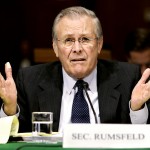Rumsfeld's Memoir Passes the Buck
 At TNR, Max Boot has provided a devastating and important review of Donald Rumsfeld's new memoir.
At TNR, Max Boot has provided a devastating and important review of Donald Rumsfeld's new memoir.
Max Boot's review of Donald Rumsfeld's memoir is devastating and important.
He was particularly egregious for failing to fire generals who did not produce results on the battlefield. This is evident in a revealing anecdote about a trip that Rumsfeld made to Iraq in April 2003. On the flight back to Kuwait on a C-130 aircraft, he was “startled” to encounter Lt. General David McKiernan, commander of CENTCOM’s ground forces and the senior officer charged with running Iraq. (General Tommy Franks, the CENTCOM commander, had already excused himself from this unpleasant chore on the way to retirement and a lucrative book deal.) Here is how Rumsfeld recounts the exchange that ensued:
I asked him where he was going.
“To my headquarters back in Kuwait,” he said.
“Well, aren’t you in charge of what’s going on in Iraq?” I asked.
McKiernan told me he went in and out of Iraq once, sometimes twice a week to check on things. It struck me that in the crucial weeks following the fall of Saddam, McKiernan did not seem to think of himself as the commander in charge of the ground operations, and didn’t seem to be preparing to take over command of all coalition forces in the country, as Franks had indicated in HIS cable. That meant that the senior American military leadership in the country consisted of Army and Marine division commanders.
It is telling that only by a chance meeting on an aircraft did the Secretary of Defense discover that no senior general was running operations in Iraq. Even more telling is how little he did about it. McKiernan, who should have been fired on the spot, would later resurface as the NATO commander in Afghanistan. “My concerns about the military’s management of Iraq in the first days of the critical postwar period were abated somewhat,” Rumsfeld says, “when I learned that there would finally be a full-time military commander.” Note the passive sentence construction—“I learned”—which suggests that he was not involved in making this pivotal decision.
The man chosen for the job was Lieutenant General Ricardo Sanchez, who, as Rumsfeld notes, was “not only the most junior three-star general in Iraq, but the most junior three-star in the entire U.S. Army.” Rumsfeld concedes that running Iraq at such a delicate moment required “a senior military official with far more experience.” So why didn’t he appoint one? That is a mystery that goes unanswered here. As usual, he lays blame elsewhere: “That the Army leadership, with the agreement of acquiescence of CENTCOM and the Joint Staff, slotted him for the top command POST was a serious misassessment.” He writes as if the army leadership, CENTCOM, and the Joint Staff did not answer to him. But they did. He could have picked any general he liked to head operations in Iraq. Instead he allowed the selection of an obviously unqualified candidate without doing anything about it.
Tweet